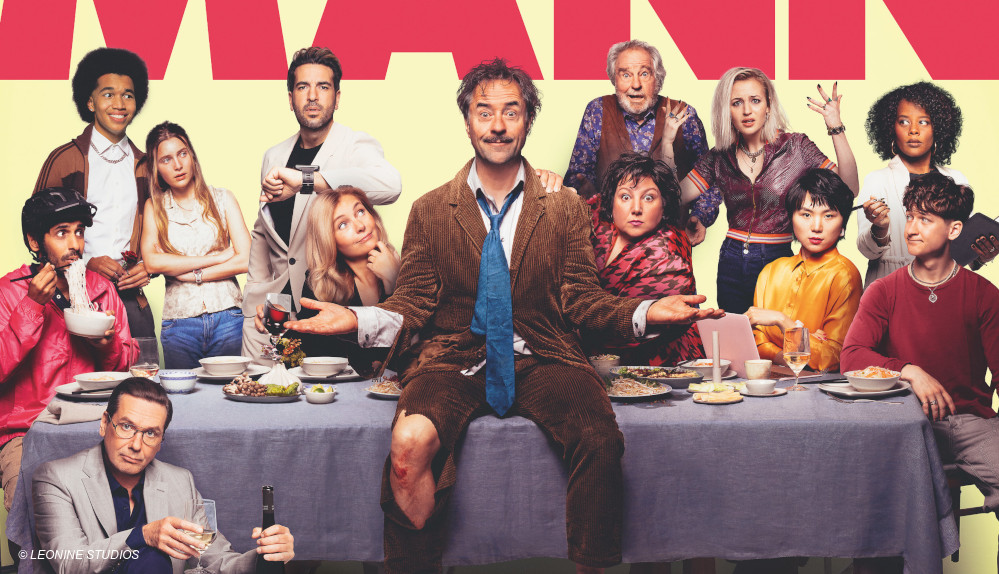German comedy cinema is once again tackling the debates of the time: Jan Josef Liefers enters the stage as the “Old White Man”.
The writer Franz Kafka has been played with so many times. This one sequence no longer matters. The “Wish to Become an Indian,” a short text by Kafka that describes a fantasy of riding a horse that mysteriously dissolves in just a few words, is shown at the beginning of Simon Verhoevens adapted to a certain extent in a new film. In it, Jan Josef Liefers rides through the landscape on a horse, bare-chested and wearing the rudiments of a Western film costume, before the morning alarm clock and the stress of everyday life bring the dream to an abrupt end. So the question is again: Is it even allowed to say “Indian” today?
Verhoeven’s comedy “Old White Man” can tick off the first points of discourse with such allusions. I-word discussion: Check. Winnetou: Check. How much horror went through the country when a few sensationalist headlines about a current new adaptation of the “Winnetou” story caused the German to suddenly fear that his Karl May, his Winnetou, might be banned from him. Ban, by whom anyway? Probably from the Greens! Or the SPD! And the Woken on the Internet! Or the big bad wolf that kills the farmers’ livestock!


“Old White Man” wants to explore the controversial issues of our time
But back to the figure of the so-called old white man, which Jan Josef Liefers embodies with dignity. Heinz Hellmich fears for his job at Fernfunk AG. He can hardly keep up with the discourse of the time. He sees faux pas, bans on speaking, shitstorms everywhere. He can no longer find his way in the hyper-political present. In order to be able to maintain his position in the company, he invites his boss and an influential management consultant to his home. Heinz wants to present himself in a particularly modern and politically correct manner and gathers various guests at the table. And that sets the stage for an escalating dinner a la “The First Name” or “The Perfect Secret” – the Germans obviously love these kinds of films.
Until that happens, “Old White Man” turns out to be a pretty average midlife crisis comedy told in aesthetically arbitrary images. Unfortunately, she misses a bit in translating the constant talking in empty phrases, irritating words, reprimands and lectures that the generations and supposed ideological differences throw at each other here into an interesting spectacle.


Everyone gets rid of their fat
“Old White Man” is ultimately less controversial than it perhaps markets itself to be. Simon Verhoeven’s comedy cleverly knows how to play everyone off against each other with all the charged topics about sexism, racism, gender, representation, discriminatory language and so on. The aim is to take the wind out of the sails of every position in order to find something like balance and balance in the social climate.
Such a concern makes comedies all too smooth and irrelevant when they are only interested in seeking the lowest common denominator. But it certainly makes sense for production if you can use it to pick up everyone. Those who feel insulted, addressed and ridiculed by the title “Old White Man” and those who use the term “Old White Man” as a killing argument and a stereotypical figure compared to other positions.
When privileged people style themselves as victims
And hey, if you follow the statements that entertainment giants like Thomas Gottschalk have been using for weeks to dominate headlines and shows, because they have recently made their business out of a form of stubbornness that insists on no longer understanding the ominous youth of today, but also on making no effort In this regard, the relativization of this film may not be so wrong after all.
Looking behind slogans and statements, understanding criticism, delving deeper into historical developments, why certain terms are understood by those affected as discrimination, how language shapes thinking – that certainly can’t do any harm! “Old White Man” pushes in such directions. It also doesn’t do any harm to realize that peaceful coexistence is only possible because in everyday life you don’t constantly say what’s on your mind. And just because you don’t know what “structural racism” is doesn’t mean that such a phenomenon doesn’t exist.
Thomas Gottschalk is, of course, just one of many who are putting their heads down in the discourse. The discussions, which are increasingly confusing in their excitement, are widespread. If “BILD” authors For example, publicly portraying people as victims and prisoners “in the woke world” because it used to be easier to be “normal”, and in the same text labeling minorities as not normal, is something very wrong. Those who always insist on how tolerant they are all too often end up being the ones who get the loudest when the other person does reveal themselves and demands their rights. They reveal that an WE versus THEM, a NORMAL versus UNNORMAL, still permanently determines thinking.


The Blind Spot of “Old White Man”
Whether inclusive speech, quota regulations or demands for self-reflection: there is always a fear of loss. You can experience this almost every week in TV talk shows and texts. People are constantly afraid of losing privileges if others are to receive the same privileges. And “Old White Man” unfortunately reveals a blind spot here. Once the bickering is over, all the faux pas and topics of the time have been dealt with, and everyone can love each other again.
This is what the film’s narrative means: The average German family has nodded its head in the direction of others a few times, but in the end, once they have buried their internal disputes, they can once again reassure themselves of their prosperity and their stable position in society. So no one has to be afraid, the film tells its audience, patting and reassuring them. Okay, nice! However, another film that lurks in the same way is never allowed to break through to the extent that it would actually be appropriate.
“Don’t we have other problems?” is what people like to say when it comes to topics like gender language. As a rule, they are the ones who create the biggest problem and harden all fronts. The pressing problem of the present is less the drama of a few whining people who can no longer find their way in all the disputes, as “Old White Man” suggests every now and then. The real problem is that populists, right-wing parties with such discursive sideshows, hot topics and outrages where there is actually nothing to be outraged are now winning elections and driving everything and everyone ahead of them. Maybe a film about it would be appropriate?
“Old White Man” has been running in German cinemas since October 31, 2024.
Notice: Some links are affiliate links. If you purchase via this link, DIGITAL TELEVISION receives a small commission. This has no effect on the price.
Source: www.digitalfernsehen.de


